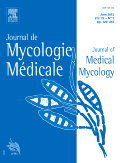
JOURNAL DE MYCOLOGIE MEDICALE
Scope & Guideline
Innovating Research for Infectious Disease Solutions
Introduction
Aims and Scopes
- Clinical Mycology and Infectious Diseases:
The journal emphasizes the clinical aspects of mycology, covering the diagnosis, treatment, and management of fungal infections in diverse patient populations, particularly those who are immunocompromised. - Molecular Mycology and Pathogenesis:
Research articles focus on the molecular mechanisms underlying fungal pathogenesis, including virulence factors, antifungal resistance, and host-pathogen interactions. - Epidemiology and Public Health:
The journal publishes studies on the epidemiology of fungal infections, highlighting trends, risk factors, and the burden of disease in different populations and regions. - Innovative Diagnostic and Therapeutic Approaches:
A significant focus is placed on the development of new diagnostic tools and therapeutic strategies, including novel antifungal agents, combination therapies, and alternative treatment modalities. - Veterinary Mycology:
The journal includes research related to fungal infections in veterinary medicine, exploring the implications of mycology in animal health and zoonotic diseases.
Trending and Emerging
- COVID-19-Associated Fungal Infections:
There is a marked increase in studies addressing the intersection of COVID-19 and fungal infections, particularly mucormycosis and aspergillosis, reflecting the pandemic's impact on patient care and outcomes. - Antifungal Resistance Mechanisms:
Research focusing on understanding antifungal resistance mechanisms, particularly in species like Candida auris and Aspergillus, is gaining traction as healthcare systems grapple with treatment failures. - Zoonotic Fungal Infections:
Emerging themes include zoonotic fungal diseases, particularly those affecting both humans and animals, indicating a recognition of the interconnectedness of human and animal health. - Nanotechnology in Mycology:
The application of nanotechnology for developing antifungal therapies and diagnostics is an increasingly popular area of research, showcasing innovative approaches to combat fungal infections. - Host Immune Response and Mycology:
Studies exploring the host immune response to fungal infections, including the role of immune modulation and potential therapeutic targets, are increasingly featured, reflecting a holistic view of infection management.
Declining or Waning
- Traditional Antifungal Agents:
Research focusing solely on conventional antifungal agents, such as azoles and amphotericin B, is becoming less prevalent, as new therapeutic strategies and novel compounds gain attention. - Historical Case Reports:
While case reports remain valuable, there is a noticeable decline in the publication of isolated case reports without broader epidemiological or clinical context, likely due to the journal's shift towards more comprehensive studies. - Fungal Taxonomy and Nomenclature:
Papers focused exclusively on the taxonomy of fungi, including descriptive studies of new species, appear to be less frequent, possibly overshadowed by research emphasizing clinical and therapeutic implications.
Similar Journals

Reviews and Research in Medical Microbiology
Unveiling Innovations in Infectious Disease ResearchReviews and Research in Medical Microbiology is a premier academic journal published by LIPPINCOTT WILLIAMS & WILKINS, focusing on groundbreaking research and comprehensive reviews that advance the understanding of medical microbiology. With an ISSN of 2770-3150 and an E-ISSN of 2770-3169, this journal serves as an essential resource for researchers, healthcare professionals, and students dedicated to the study of pathogens, infectious diseases, and microbial mechanisms affecting health. While the journal currently does not offer open access, its rigorous peer-review process ensures that only high-quality, impactful research is disseminated to the scientific community. The journal aims to bridge gaps in knowledge by presenting cutting-edge studies that explore novel therapeutic strategies, diagnostic methods, and the evolving landscape of microbial resistance. Nestled in the heart of Philadelphia, this journal proudly contributes to the advancement of medical microbiology and is an indispensable platform for the publication of critical findings that shape clinical practices and research trajectories in the field.
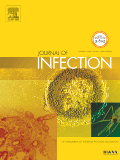
JOURNAL OF INFECTION
Pioneering Insights into Infectious ProcessesJOURNAL OF INFECTION is a premier academic publication in the fields of infectious diseases and medical microbiology, published by W B SAUNDERS CO LTD. With a profound impact factor and established since 1979, this journal serves as a crucial resource for researchers, clinicians, and policy-makers seeking to advance knowledge and understanding of infectious processes and their management. The JOURNAL OF INFECTION holds an impressive position in the academic hierarchy as reflected by its Q1 quartile rankings in both Infectious Diseases and Microbiology (medical) for 2023, further underscored by its Scopus rankings: #2 in Medical Microbiology and #5 in Medical Infectious Diseases, placing it in the 98th percentile overall. While the journal does not offer Open Access options, it provides a comprehensive outlet for innovative research, reviews, and clinical insights that drive the field forward. Published from the United Kingdom, it attracts a global readership keen on staying at the forefront of infectious disease research, making it an essential addition to any academic and clinical library.

MYCOSES
Pioneering research for a healthier tomorrow.MYCOSES is a renowned academic journal published by Wiley, specializing in the fields of Dermatology, Infectious Diseases, and general Medicine, with a commendable focus on mycological research and its clinical implications. Established in 1957, this journal has significantly contributed to advancing our understanding of fungal diseases, offering a platform for high-quality research that ranks among the top in its categories—achieving Q1 status in Dermatology and Q1 in Medicine (miscellaneous), while maintaining a strong Q2 ranking in Infectious Diseases. With an impressive Scopus ranking of #5 in Medicine - Dermatology, MYCOSES occupies a pivotal position in the dissemination of critical findings and innovative practices within the scientific community. Although it is not an open-access journal, MYCOSES continues to attract a wide array of researchers, professionals, and students seeking to enhance their knowledge and keep abreast of the latest developments in mycology. Overall, MYCOSES not only serves as an essential resource for academia but also plays a vital role in shaping future research directions and clinical approaches to fungal infections.
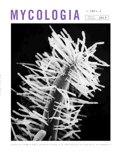
MYCOLOGIA
Connecting researchers to the forefront of mycological science.MYCOLOGIA, published by Taylor & Francis Inc, is a prestigious journal that has been at the forefront of fungal research since its inception, with converging years of publication from 1945 to 2024. This interdisciplinary journal, identified by ISSN 0027-5514 and E-ISSN 1557-2536, stands out in various scientific categories, achieving Q1 rankings in Ecology, Evolution, Behavior and Systematics, as well as Plant Science, alongside strong performances in Cell Biology and Molecular Biology categories. With an impact factor that reflects its significance in the field, MYCOLOGIA appeals to a diverse audience, including researchers, professionals, and students dedicated to advancing the understanding of fungal biology and its ecological implications. Notably, while it does not currently operate under an Open Access model, the journal remains a vital resource for those pursuing groundbreaking discoveries in mycology and related disciplines.
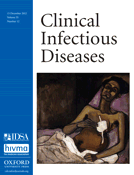
CLINICAL INFECTIOUS DISEASES
Pioneering research for a healthier tomorrow.Clinical Infectious Diseases, published by Oxford University Press Inc, is a premier journal in the fields of infectious diseases and microbiology, distinguished by its esteemed Q1 ranking in both categories as of 2023. Since its inception, the journal has served as a vital platform for disseminating cutting-edge research and significant advancements in the diagnosis, treatment, and prevention of infectious diseases. With a broad scope encompassing clinical trials, epidemiological studies, and public health research, it targets a diverse readership, including researchers, healthcare professionals, and students. The journal's robust reputation is underscored by its impactful contributions to scientific understanding, making it a critical resource for those striving to combat infectious diseases globally. Clinical Infectious Diseases is not open access but offers various subscription options, ensuring comprehensive access to its high-quality content. With a historical continuity from 1985 to present, the journal remains at the forefront of medical research, paving the way for future innovations in the field.
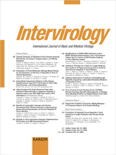
INTERVIROLOGY
Your gateway to cutting-edge virology discoveries.INTERVIROLOGY is a leading academic journal dedicated to advancing the field of virology and infectious diseases, published by KARGER. With a commendable history since its inception in 1973, the journal is currently poised to explore innovative virological research through to 2024. INTERVIROLOGY is indexed with the ISSN 0300-5526 and E-ISSN 1423-0100, reflecting its commitment to maintaining high scholarly standards. The journal is categorized within the Q3 quartile for both Infectious Diseases and Virology as of 2023, demonstrating its relevance and contribution to the academic community. With Scopus rankings placing it as #130 in Infectious Diseases and #41 in Virology, INTERVIROLOGY serves as an essential resource for researchers, professionals, and students seeking cutting-edge insights and discoveries in virology. While it currently operates under a subscription model, its rigorous peer-review process ensures a high quality of published content, making it a cornerstone for those dedicated to understanding and combating viral diseases.

Emerging Microbes & Infections
Leading the charge in infectious disease innovation.Emerging Microbes & Infections is a premier open access journal, published by Taylor & Francis Ltd since 2012, dedicated to advancing the understanding of microbial infections and their implications in human health. With an impressive Q1 ranking across multiple categories—including Drug Discovery, Epidemiology, Immunology, and Infectious Diseases—this journal is at the forefront of research in the microbiological sciences. Covering a diverse range of topics, it serves as a vital resource for researchers, healthcare professionals, and students alike. The journal's commitment to open access ensures worldwide dissemination of cutting-edge findings, fostering collaboration and innovation in tackling challenges posed by emerging infections. As part of the thriving academic community in the United Kingdom, Emerging Microbes & Infections plays a crucial role in shaping the future of infectious disease research and public health.

mSphere
Elevating scientific dialogue in the microbial realm.mSphere is a leading open-access journal published by the American Society for Microbiology, dedicated to the dynamic fields of Microbiology and Molecular Biology. Since its inception in 2016, mSphere has rapidly established itself as a reputable source of scholarly research, achieving notable impact factors and excellence within the academic community. The journal ranks in the top quartile (Q1) amongst its peers in Microbiology, and Q2 in the field of Molecular Biology, demonstrating its significance and relevance through Scopus rankings—specifically, it holds the #42 spot out of 182 in the Microbiology category and #108 out of 410 in Molecular Biology. With an editorial commitment to advancing the understanding of microbial and molecular sciences, mSphere provides an accessible platform for researchers, professionals, and students alike to disseminate groundbreaking findings. The journal promotes rigorous peer-review and invites innovative contributions aimed at enhancing microbial research mobility and molecular exploration. Accessible openly since 2016, mSphere continues to thrive as an influential publication driving scientific dialogue and discovery in the microbiological sciences.

MEDICAL MICROBIOLOGY AND IMMUNOLOGY
Pioneering discoveries in the realms of microbiology and immunology.Medical Microbiology and Immunology is a renowned journal published by Springer, serving as a pivotal resource in the fields of microbiology and immunology. Established in 1971 and continuing its legacy through 2024, this journal features cutting-edge research and reviews that address critical advancements and challenges within these dynamic fields. With an impressive impact factor and a robust ranking, including Q1 categories in both Microbiology (medical) and Immunology, it stands at the forefront of scholarly communication, ranking 21st out of 140 in the realm of Medical Microbiology. Researchers and professionals are encouraged to explore a variety of studies that delve into the interactions between microorganisms and the immune system, making it an essential resource for anyone fascinated by these interconnected realms of health sciences. Although not open access, the journal is widely accessible through institutional libraries, ensuring that significant findings reach a global audience. The University of New York Plaza serves as its operational hub in the USA, reinforcing its international influence and dedication to advancing knowledge in microbiology and immunology.

International Journal of Mycobacteriology
Unveiling the complexities of infectious diseases.International Journal of Mycobacteriology is a peer-reviewed, open-access journal published by Wolters Kluwer Medknow Publications that specializes in the field of infectious diseases with a particular emphasis on mycobacterial research. Since its inception in 2012, this journal has emerged as a vital resource for researchers, healthcare professionals, and students aimed at advancing understanding and treatment of mycobacterial infections, including tuberculosis. With the journal being indexed in Scopus and holding a Q3 ranking in both Infectious Diseases and Microbiology (medical) for 2023, it reflects a substantial contribution to scholarly discourse in these domains, despite its current ranking positioning. Authors and readers benefit from the open access model, ensuring widespread dissemination of research findings and fostering collaboration across the global health community. Located in Mumbai, India, the journal continues to thrive with a commitment to quality research and innovation, welcoming contributions that further the exploration of mycobacteriology throughout the converged years from 2012 to 2024.